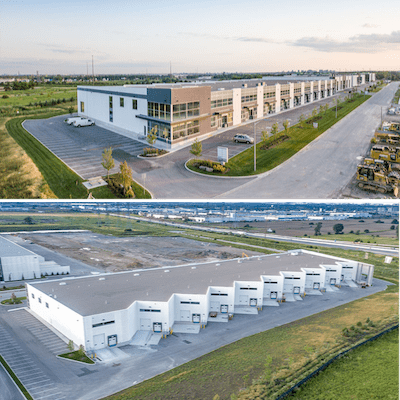Commercial condos in Ontario have been gaining popularity among small business owners, investors, and larger companies. They offer a unique blend of ownership advantages, similar to residential condominiums, while allowing businesses to operate from a space they own rather than lease. This can be an attractive option for those looking for stability, equity building, and a location tailored to their needs.
In this post, we’ll dive into what a commercial condo is, how it differs from residential condos, the legal framework behind it, and the advantages and disadvantages of investing in such properties.
On This Page
What is a Commercial Condo?
A commercial condo is a unit in a multi-unit property designated for business or commercial purposes. Like residential condominiums, buyers of commercial condos own their individual unit but share ownership of common areas. These areas can be hallways, lobbies, and parking facilities. Commercial condos can be used for a wide variety of business activities, including retail, office spaces, and even light industrial use (depending on zoning regulations).
Commercial condos often exist within larger mixed-use developments. Retail units may occupy lower floors of a residential tower, and residents live in upper floors. This design allows businesses to operate in high-traffic areas with a built-in customer base from the same building.
Differences Between Commercial and Residential Condos
While both commercial and residential condos function similarly in terms of shared ownership of common areas, there are key differences:
- Usage and Zoning:
Residential condos are meant for living, while commercial condos are strictly for business operations. Zoning regulations are stricter for commercial condos, ensuring that the property is used for business purposes and meets specific requirements for parking, accessibility, and signage. - Cost and Maintenance Fees:
Commercial condos generally have higher maintenance fees due to the increased traffic and wear and tear associated with businesses. Owners are responsible for additional costs like liability insurance and sometimes security upgrades tailored to business needs. - Legal Framework and Governance:
Both types of condos are governed under the Condominium Act, 1998, which regulates the creation, purchase, management, and governance of condominium properties. However, commercial condos have specific by-laws and zoning requirements aligned with business operations, which can be more stringent than residential condos. Under this act, commercial condo boards oversee the maintenance of shared spaces, set rules, and ensure that businesses comply with local zoning and regulatory standards.
The Condominium Act and Commercial Condos
In Ontario, commercial condos fall under the Condominium Act, 1998, which provides a legal framework for condominium ownership and management. The act governs everything from the establishment of the condo corporation to the responsibilities of the board of directors, how common expenses are managed, and how disputes are resolved.
Recent amendments to the act, effective as of October 2023, introduced new provisions for electronic communications, virtual meetings, and voting. These were aimed at improving transparency and convenience for condominium owners. These changes apply to both residential and commercial condos and offer more flexibility for condo corporations to conduct meetings and communicate with owners through modern technology.
In a commercial condo setting, condo fees are collected from the business owners to cover the maintenance and operation of common areas. The act also mandates that condo boards ensure compliance with business-specific regulations. These can include zoning and safety requirements, such as fire codes and accessibility laws.
When purchasing a commercial condo, obtaining a status certificate is an essential step. This document provides important information about the condominium corporation, including its financial health, legal matters, and any outstanding obligations. For businesses, the status certificate reveals whether there are any upcoming special assessments, unpaid fees, or legal disputes that could impact your investment. It also outlines the rules and regulations that apply to the property, ensuring that your business operations comply with the condo corporation’s bylaws. Understanding this document helps protect your financial interests and ensures you’re making an informed decision.

Advantages of Commercial Condos
1. Property Ownership and Control:
Commercial condo owners have full control over their space, offering stability and protection against rising lease costs. This is a key advantage over traditional leasing, where business owners are at the mercy of landlords who may raise rents or impose lease restrictions.
2. Building Equity:
Owning a commercial condo allows business owners to build equity in their property. Over time, the value of the unit may appreciate, which can lead to a profitable sale in the future.
3. Tax Benefits:
Owners can take advantage of certain tax deductions available to property owners, such as mortgage interest, depreciation, and other business-related expenses.
4. Mixed-Use Opportunities:
In mixed-use developments, businesses benefit from having access to a built-in customer base. Retail stores, for example, may attract customers from residents living in the same or neighboring buildings, increasing foot traffic and sales.
5. Income Potential:
Commercial condo owners have the option to lease their unit to other businesses. If a business outgrows its space or decides to relocate, leasing the property provides additional income opportunities.
Disadvantages of Commercial Condos
1. High Initial Investment:
Buying a commercial condo typically requires a larger upfront investment than leasing. Owners would need a down payment, legal fees, and ongoing maintenance costs. This can be a barrier for small businesses with limited capital.
2. Lack of Flexibility:
Unlike leasing, where a business can relocate or expand easily, owning a commercial condo ties the business to a specific location. If a business needs more space or a better-suited location, selling the property or finding tenants to rent the unit can take time.
3. Shared Responsibility:
Similar to residential condos, commercial condo owners are part of a condominium corporation and must follow its rules and regulations. Shared responsibilities can be a disadvantage when decisions need to be made collectively, especially if other owners have different priorities or goals for the property.
4. Market Volatility:
The value of a commercial condo is subject to market conditions. While commercial real estate in high-demand areas like Toronto tends to appreciate, downturns in the economy or shifts in business patterns could reduce the property’s value.
Conclusion
Commercial condos offer a compelling opportunity for businesses to own their workspace and build long-term equity. By investing in a commercial condo, business owners can control their environment, stabilize their monthly costs, and potentially benefit from market appreciation. However, the high initial investment and lack of flexibility are important considerations to weigh before purchasing a unit.
For businesses seeking stability and a prime location within urban centers, commercial condos can provide the right balance of investment potential and operational control.
